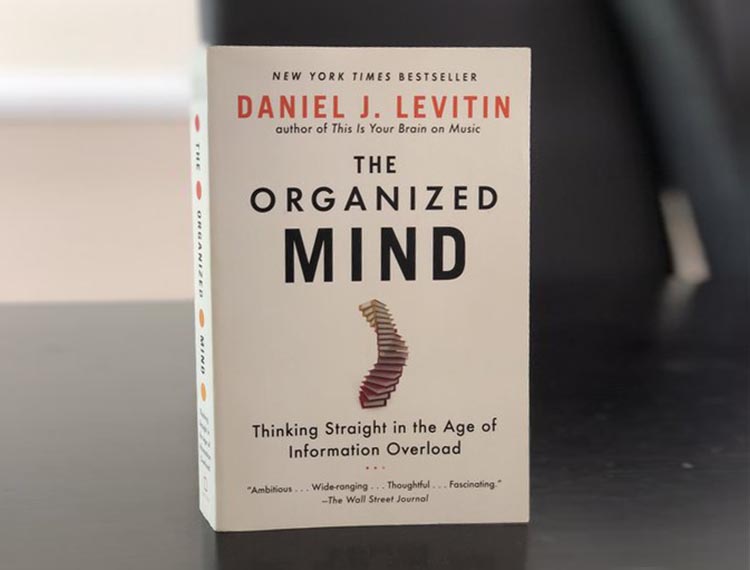The Organized Mind: Thinking Straight in the Age of Information Overload – Book Review

Rejigging Your Thoughts
Professor Dan Levitin’s (@DanLevitin) bestseller The Organized Mind bears a subtitle likely to stir instant agreement among all manner of readers: Thinking Straight in the Age of Information Overload.
Levitin is a keen writer, with rich themes which seem relevant reads in our busy modern world.
Aficionados won’t be disappointed by The Organized Mind, a 490-page treasure trove of theory, hints, reports, references, and issues that embrace neurochemistry, philosophy, our brain’s central executive function, the business world, education, family life, et al.
Yet such extensiveness can be a burden. Having acknowledged folk are swamped by data (too frequently following them home via laptop), he has delivered a densely packed treatise which is weighty, with summaries occasionally short of tactics.
How many readers who absorbed four hundred pages of TOM then passed a hurdle of twenty questions on its content? Be cautious – ‘memory is unreliable’.
Chapter 8 on What to Teach our Children contrasts professional findings worthy of encyclopaedias against the instant, fan-based, and less stringent presentations of Wikipedia, the author stresses Wiki needs editors: rumour and deliberate misinformation must not be mistaken for data which has survived the stringencies of peer review. A catchphrase ‘Correlation is not causation’ is explained and followed by sampling bias, selective windowing, and boundary conditions.
To unravel a biological interplay (p 351) between the benefits of omega-3 fish oil capsules and potential risks, Levitin gathered the opinion of cardiologists, urological oncologists, and internists, and promoted further study on the question. Well, yes, fascinating, but while the author’s eyelids may have become uncomfortably heavy at his keyboard, alert parents will spot chapter eight’s title seems directed at coaching children – not graduates – youngsters unlikely to have avoided pre-Covid overloads triggered by the school curriculum.
A summing up that children need to be taught ‘to think clearly, completely, critically, and creatively’ certainly isn’t taboo, but might have been borrowed from (almost!) any national educational ideology. At the PowerPoint, tutors keen to discuss, say, 1066 are restricted to allocated hours in the school timetable, so opportunities to revise William’s campaign alongside the rest of the term’s top-down material will be limited.
Alas, some staff may have contemporary battles of their own when a young audience’s hearts and minds become happily engaged in peer group chat, or each daydreaming aimlessly in what Levitin calls ‘the mind-wandering mode’, which for Homo sapiens is the default mode.
Okay, perhaps I’m too ungracious about this book. I acknowledge that logic, order, and categories are important, whether gently practising personal dental hygiene in the bathroom, appreciating the periodic tables’ rationale (p 373), or being prompted by artfully designed switches if flying a commercial airliner.
I’m unclear about how folk in disparate contexts might deploy Levitin’s principles so that appropriate information is put into action.
What image of their frequently changing real-world setting should be discussed further?
Neil Richardson, Kirkheaton










Responses